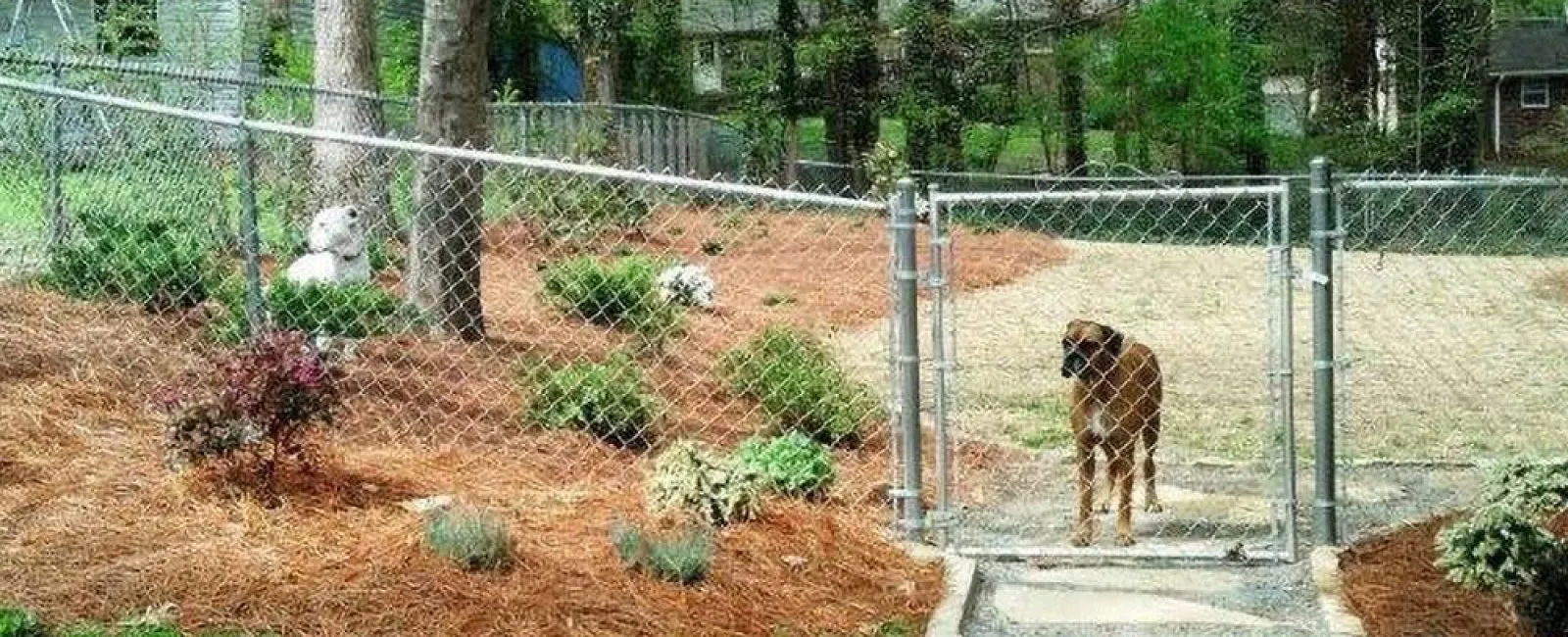People love dogs. With over 65 million dog owners in the U.S., our society is increasingly geared toward dog-friendly spaces. One of the most important spaces is the dog’s own backyard. To keep our furry family members safe, it’s essential to install the best fence for dogs. A secure fence protects them from predators, keeps them out of the road, and allows them the freedom to roam and play.
However, a “one size” fence doesn’t fit all dogs. Dogs not only come in different sizes themselves, but they also have quite different personalities. So how do you know which is the best fence for man’s best friend?
The fencing experts at First Fence of Georgia will walk you through some things to consider.
What’s the Best Fence Height for Dogs?
One of the most frequent questions we get from dog-owners is: what’s the best height for dogs? In most cases, six feet is a good fence height for keeping your dog safely contained.
However, the optimal fence height as well as fence material depends on a number of things. Is your furry friend big or small? Are they calm or excitable? Do they act aggressive toward strangers? Are they homebodies or escape artists?
The answers to these questions will help determine the right fence for your dog’s unique needs.
Best Fence for Dogs that Like to Dig
As many pet owners know, some dogs are champion diggers. While it boils down to individual temperament, there are some breeds that are likelier to dig than others. These include:
- Dachshund
- Siberian husky
- Border collie
- Beagle
- Jack Russel terrier
- Australian shepherd
- Bloodhound
- Miniature schnauzer
Basically, if your dog is part of the terrier or shepherd families, there’s a good chance they’re a digger.
In this case, the fence height isn’t as important as the installation. Installing a concrete base or buried wire mesh beneath the fence line can be a great way to deter your dog from trying to dig its way out. Additionally, consider creating a designated “dig zone” within the fenced in area. Add sand or soft soil and teach your dog that it’s okay to dig only in this spot.
Best Fence for Dogs that Jump
If “don’t jump” is a frequent part of your vocabulary, you probably need to choose a fence designed for athletic canines. Most dogs cannot jump higher than six feet. However, some breeds, like Belgian shepherds, German shepherds, and border collies, can scale a fence of that size. In general, if your dog can get its head, front legs, and half its body weight to the other side, they will be able to slide or jump over. In that case, try extending your fence height to eight feet. You can also choose a fence design that doesn’t offer footholds. Smooth surfaces like PVC or metal make it more difficult for them to find traction. Additionally, anti-jump devices like angled extensions or coyote rollers can help keep your pet safely in their own yard.
Best Fence for Dogs that Climb
Many dogs love to climb, and some are so good at it that they can even climb trees. Examples include treeing walker coonhounds, Belgian shepherds, Jack Russell terriers, and even chihuahuas. Like their jumping counterparts, climbing dogs require a fence that doesn’t offer footholds. A solid panel fence made from composite or PVC makes climbing more difficult due to the smooth finish. Another option is a chain-link fence with slats or mesh attachments. Additionally, metal pickets with spears can be a great climbing deterrent.
Best Fence for Aggressive Dogs
Some dogs are great with their families or packs but can be aggressive toward outsiders. If your pet is one of these, it’s essential to install secure fencing to protect both your dog and others. In fact, many Georgia municipalities have regulations in place regarding fences for certain breeds. This helps prevent unwanted incidents that could harm others, your dog, and your wallet, since Georgia is a strict liability state. It’s important to check if your dog’s breed qualifies as potentially dangerous where you live, and to follow required safety protocols. Even if your area doesn’t have laws in place, a sturdy fence with a secure gate is the best prevention. Solid panel wooden, composite or vinyl fencing, or an aluminum fence with angled extensions make good options.
Best Fence for Toy or Small Breeds
Toy or smaller dog breeds sometimes need extra protection. They’re more vulnerable to predators than larger dogs. It’s also easier for them to slip under or in between fence rails and pickets, escaping the safety of their yard. For these pint-sized pooches, a fence with smaller gaps or solid panels can help prevent your dog from squeezing through or getting stuck. A rail fence combined with wire mesh or a metal fence with narrow spacing between the pickets are excellent choices.

Best Fence for Large Breeds
Anyone who has ever had their large dog pull at their leash knows just how strong these gentle giants can be. Due to that strength, larger dog breeds need robust and reliable fencing solutions. A tall solid panel fence, chain link fence, or heavy-duty aluminum pickets are all good options. Whatever design you choose, opt for sturdy materials that can withstand the strength and size of large breeds. It’s also important to ensure that the fence has secure gates and reinforced corners. This helps prevent potential weak spots that a big dog can exploit.
Partner with a Trusted Fencing Professional
When it comes to your dog, you want the best. That includes choosing the best fence and the best fence company to help keep them safe. At First Fence of Georgia, we understand that dogs aren’t just pets. They’re family. We can help you make an informed choice that best suits your dog’s unique requirements. With the right fence, you can provide your furry family members with the freedom they deserve. Contact us today for a free estimate.


